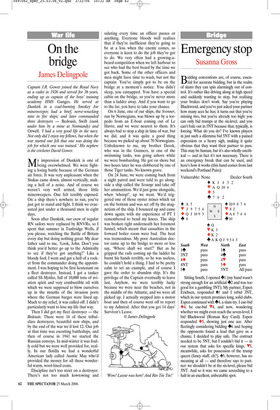On the bridge
James Delingpole
Captain J.R. Gower joined the Royal Navy as a cadet in 1926 and served for 36 years, ending up as captain of the boys’ training academy HMS Ganges. He served at Dunkirk in a coal-burning Smokey Joe minesweeper; had a brief, nerve-wracking stint in fire ships; and later commanded three destroyers — Bedouin, Swift (sunk under him by a mine at Normandy) and Orwell. ‘I had a very good life in the navy. Not only did I enjoy my fellows, but when the war started one felt that one was doing the job for which one was trained.’ His nephew is the cricketer David Gower.
My impression of Dunkirk is one of being overwhelmed. We were fighting a losing battle because of the German air force. It was very unpleasant when the Stukas came down, almost vertically, making a hell of a noise. And of course we weren’t very well armed, those little minesweepers. One felt terribly exposed. On a ship there’s nowhere to run, you’ve just got to stand and fight. I think we evacuated just under a thousand men in eight days.
Soon after Dunkirk, our crew of regular RN sailors were replaced by RNVRs, so I spent that summer in Tunbridge Wells, if you please, watching the Battle of Britain every day but doing nothing great. My dear father said to me, ‘Look, John. Don’t you think you’d better go up to the Admiralty to see if they’ve got anything?’ Like a bloody fool, I went and got a hell of a rocket from the commander doing the appointment. I was hoping to be first lieutenant on a fleet destroyer. Instead, I got a tanker called SS Mytilus, full of 10,000 tons of aviation spirit and very combustible oil with which we were supposed to blow ourselves up in the mouths of the invasion ports where the German barges were lined up. Much to my relief, it was called off. I didn’t particularly want to lose my life that way.
Then I did get my fleet destroyer — the Bedouin. There were 16 of these tribalclass destroyers, beautiful new ships, and by the end of the war we’d lost 12. Our job at that time was escorting battleships, and then of course in 1941 we started the Russian convoys. In mid-winter it was foully cold but we were well provided for, really. In our flotilla we had a wonderful American lady called Auntie May who’d provided the money for all these wonderful warm, wool-lined coats.
Discipline isn’t too strict on a destroyer. There’s not too much kowtowing and saluting every time an officer passes or anything. Everyone bloody well realises that if they’re inefficient they’re going to be at a loss when the enemy comes, so everyone is keen to do the job they’ve got to do. We very often had a growing-abeard competition when we left harbour to see who had the best beard by the time we got back. Some of the other officers and men might have time to wash, but not the captain. You’ve simply got to be on the bridge at a moment’s notice. You didn’t sleep, you catnapped. You have a special cabin on the bridge, so you’re never more than a ladder away. And if you want to go to the lav, you have to take your chance.
On 6 June, one of our ships, the Svenner, run by Norwegians, was blown up by a torpedo from an E-boat coming out of Le Havre, and we were nearest to them. It’s always bad to stop a ship in time of war, but we did, and it was quite a good thing because we picked up about 70 Norwegians. Unbeknown to me, my brother Derek, who was in the Gunners, in one of the swimming tanks, was going ashore while we were bombarding. He got on shore but two hours later he was clobbered by one of those Tiger tanks. No known grave.
On 24 June, we were coming back from a night patrol and were told to go alongside a ship called the Scourge and take off her ammunition. We’d just gone alongside, when ‘whoop!’, up we went. We’d triggered one of those oyster mines which sat on the bottom and was set off by the magnetism of the ship. I bounced up and came down again; with my experience of PT I remembered to bend my knees. The ship was broken right underneath her foremost funnel, which meant that casualties in the forward boiler room were bad. The heat was tremendous. My poor Australian doctor came up to the bridge to more or less say, ‘Where shall we start?’ But as he gripped the rails coming up the ladder he burnt his hands terribly, so he was useless, he couldn’t hold a thing. I had to be pretty calm to set an example, and of course I gave the order to abandon ship. It’s the privilege of the Captain eventually to leave last. Anyhow, we were terribly lucky because we were near the beaches, not in the middle of the Atlantic, and we were all picked up. I actually stepped into a motor boat and then of course went off to report to my Admiral. After that you get 14 days’ Survivor’s Leave.
© James Delingpole























































 Previous page
Previous page